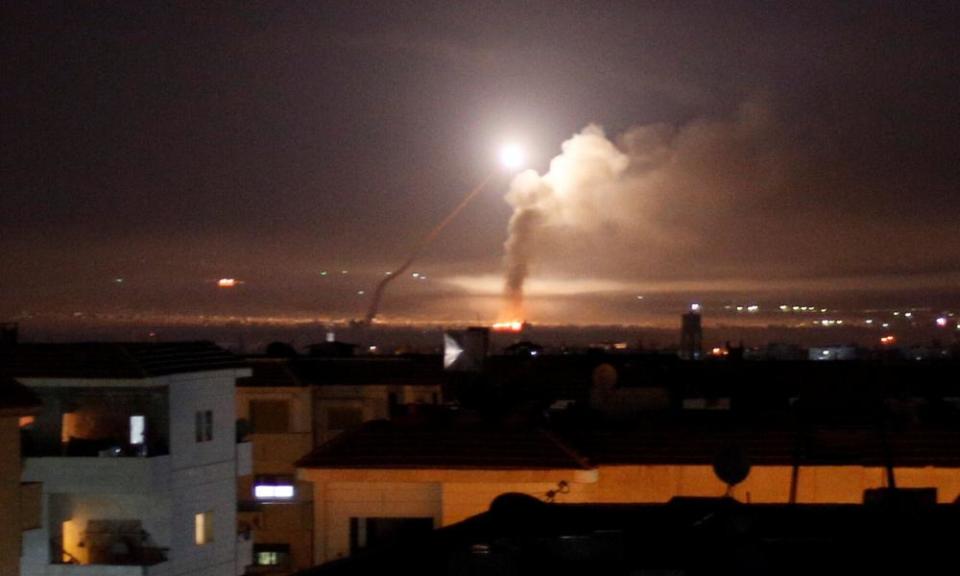Israel retaliates after Iran 'fires 20 rockets' at army in occupied Golan Heights

Arch-enemies Iran and Israel edged closer to all-out war on Thursday after Israel’s military said its positions in the Golan Heights were fired at with a barrage of Iranian rockets, prompting it to respond with extensive strikes targeting Tehran’s forces across Syria.
The attack, if confirmed, would mark the first time Iran has fired rockets in a direct strike on Israeli forces, dramatically ratcheting up what has for years been a conflict fought through proxies.
Several but not all of the Iranian rockets were intercepted by Israeli defences, an Israel Defense Forces (IDF) spokesman, Lt Col Jonathan Conricus, told reporters.
“At approximately 12.10, 10 minutes past midnight, forces belonging to the Iranian Quds Force fired approximately 20 projectiles – most of them are probably rockets but that is yet to be determined – towards the forward line of IDF positions in the Golan Heights,” he said.
“So far we are not aware of any casualties, any IDF casualties,” he said. A preliminary assessment found there was minimal damage, he added.
Israel accused the general in charge of the Iranian Revolutionary Guards Corps’ external operations branch of orchestrating the attack.
“It was ordered and commanded by Qassem Soleimani and it has not achieved its purpose,” Conricus said.
The occupied Golan Heights has been on high alert since Donald Trump confirmed he was pulling the US out of the Iran nuclear deal.
“The IDF views this Iranian attack very severely,” Conricus said. “This event is not over.”
In the early hours of Thursday morning, the IDF’s Arabic-language Twitter account said its military was “moving” against Iranian targets in Syria and warned Damascus not to intervene. Conricus said Israel had notified Russia before the strikes began. The military later said it had hit “dozens” of Iranian military targets in Syria.
The Syrian capital was shaken with explosions as jets flew overheard before dawn, with residents posting videos online of what appeared to be air defence missiles running bright streaks through the night sky and reporting loud sounds that rocked their buildings.
Syrian state media said its anti-aircraft batteries were responding to a “new wave of Israeli missiles and is dropping them one by one”. However, it added, missiles struck radar, air defence positions and ammunition warehouses. Explosives fired from Israel also hit southern Syria’s Quneitra province, adjacent to the Golan Heights, it said. There were no reported casualties.
Iran did not immediately comment.
The Israeli newspaper Haaretz quoted an unidentified security official as saying Israel’s attacks inside Syria were the most extensive since the two nations signed a disengagement agreement after the October war of 1973.
Israel has warned it will not permit Tehran to establish a permanent military presence in Syria, accusing Iran of moving drones and missiles into its Arab neighbour. Iranian forces have been sent to aid the Syrian government in a devastating seven-year civil war against insurgents.
Donald Trump’s move to exit the 2015 nuclear agreement with Iran was welcomed by Israel but has stoked fears of a regional flare-up.
Just minutes before Trump was due to speak on Tuesday, the IDF said it had identified “irregular activity of Iranian forces in Syria” and had decided to unlock and ready bomb shelters in the Golan, where it shares a frontier with Syria.
“Additionally, defence systems have been deployed and IDF troops are on high alert for an attack,” it said. “The IDF is prepared for various scenarios and warns that any aggression against Israel will be met with a severe response.”
Hours after Trump’s announcement, Syrian state media said that its air defences had brought down two Israeli missiles. The Syrian Observatory monitoring group, which tracks the conflict, said that attack killed 15 people, including eight Iranians. Israel did not comment on the strikes.
In February, Israel said it had downed an armed Iranian drone that penetrated its airspace. Since then Israel’s air force is believed to have struck Iranian targets operating in Syria several times, including a 9 April strike on the country’s largest airbase, killing seven Iranians. Tehran has vowed revenge.
The Quds Force is an external arm of the Iranian Revolutionary Guards Corps, which Israel’s intelligence community said was tasked with a retaliatory attack.
Israel’s prime minister, Benjamin Netanyahu, one of the biggest critics of the Iran deal and close Trump ally, told his cabinet on Sunday he was “determined to block Iran’s aggression against us even if this means a struggle”.
“Better now than later,” he said. “We do not want escalation but we are prepared for any scenario.”
Trump’s daughter, Ivanka Trump, and her husband, Jared Kushner, are due to arrive in Israel in the next few days for the opening of the US embassy in Jerusalem. The US president’s decision in December to recognise the city as Israel’s capital has infuriated Palestinians and reverberated across the region.
The occupied Golan Heights is a plateau captured from Syria in 1967 by Israel in a move not recognised by the international community.

